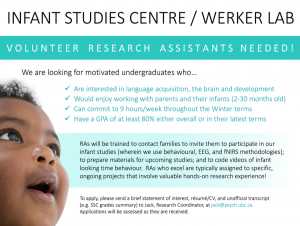
The UBC Infant Studies Centre (Werker Lab) is now accepting applications for Research Assistant positions in the upcoming academic year! They are currently seeking motivated undergraduates who…
- Are interested in language acquisition, the brain, and development
- Would enjoy working with parents and their infants (2-30 months old)
- Can commit to 9 hours/week throughout the Winter terms
- Have a GPA of at least 80% either overall or in their latest terms
RAs will be trained to contact families to invite them to participate in infant studies (which involve behavioural, EEG, and fNIRS methodologies), prepare materials for upcoming studies, and code videos of infant behaviour. RAs who excel are often assigned specific, ongoing projects that involve valuable hands-on research experience!
To apply, please send a brief statement of interest, resume/CV, and unofficial transcript (e.g. SSC grades summary) to Jack, Research Coordinator, at jack@psych.ubc.ca. Applications will be assessed as they are received.